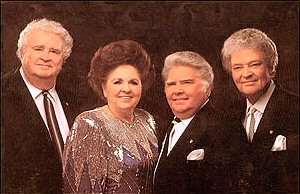 Happy Goodmans (1990) |
Group MembersVocalists |
The Happy Goodmans (1938-1983, 1990, 1996-2002)
History
Various combinations of the eight Goodman siblings (Howard, Sam, Charles (Rusty), Bobby, Ruth, Eloise, Stella, and Gussie Mae) were led by their oldest brother Howard (nicknamed “Happy”) in the early years. In 1949, Howard met Vestal Freeman, an aspiring opera singer and sister of gospel tenor singer Cat Freeman. They were soon married. By 1962, the singing group fans most fondly remember as The Happy Goodmans had formed consisting of Howard, Vestal, Sam, and Rusty. Their younger brother Bobby was soon in the band as well playing bass guitar.
From that point in the early 1960s, the fame of The Happy Goodmans took off like a rocket. On the final chord of a song when everyone else was sustaining their note, Vestal would often hit a dissonant note and then resolve to her note in the chord with a curlicue flourish. Their style has been described as “grab a note and hang on.”
In 1964, they joined the cast of The Gospel Singing Jubilee television program which was syndicated in markets across the country. By 1974, The Happy Goodmans had signed a contract with concert promoter JG Whitfield guaranteeing them $2500.00 for each event and a minimum of 100 events for both 1974 and 1975. After the Jubilee, they launched a television program of their own called The Happy Goodman Family Hour and later had another program called Down Home With The Happy Goodman Family.
They were known for their excitement and humor in concerts. After tenor singer Johnny Cook joined the group in the mid-1970s, they developed a routine using the song “Looking For A City” with the key climbing a half step higher on each repeated chorus. Cook and Vestal competed to see who could sing the highest, and audiences ate it up.
By 1980, Howard and Vestal left the group. They later stated they felt pressured to take the group’s sound in a more contemporary direction and decided it was time to move on to something else. Sam and Rusty remained as did tenor singer Johnny Cook. Rusty’s daughter Tanya who had traveled with the group for a few years in the 1970s returned to the group. This version continued through 1983 before retiring.
In 1984, Howard, Vestal, Sam, and Rusty reunited to sing at the National Quartet Convention. Then, in 1990 after it was discovered that Rusty had cancer, the four came together again to record an album titled The Reunion. Plans for a tour were being made as well, but Rusty’s health was on such a rapid decline that the tour didn’t take place. Rusty passed away in November of that same year. The family was dealt another blow when Sam passed away just nine months later.
By 1993, the Gaither Homecoming video series had brought Howard and Vestal back to prominent attention. That year, they revived The Happy Goodmans as a trio with former band member Johnny Minick singing the third part. This combination traveled and sang through 2002 when they were forced to retire due to Howard’s declining health. Howard passed away in November and Vestal followed him 13 months later in December of 2003.
Awards
GMA Hall Of Fame (1998)
Singing News Fan Awards:
Favorite Group (1970, 1973)
Album of the Year (1971 - Good Times)
